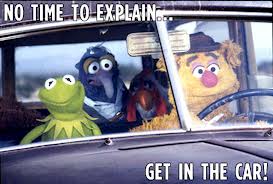Happy Hump Day, dear readers! The weekend is almost in sight, Monday is a distant memory, and in a short five hours, you will be over the “hump” of yet another week in the wonderful world of workers’ compensation.
Now, I know what my beloved subscribers, twitter followers, and random google search visitors (who keeps googling “humble logger”?) are all collectively thinking: “I am so desperately craving a blog post on the going and coming rule – that’s my favorite rule of all! Don’t disappoint me, Greg.”
For those not in the know, the going and coming rule basically sets a giant wall between coming to (or from) work and work itself. Like all good rules, this one is riddled with giant exceptions through which elephants can comfortably march in rows of four, but in certain instances it kicks in to shield the employer from liability. And, as you know, it’s not just workers’ compensation liability, but also liability to third parties caused by the negligence of employees.
So, I bring to your attention the recently writ denied case of Aguilar v. BHS Corrugated North America. Therein, a worker gingerly hopped into the employer’s rented car to go off-site for an unpaid half-hour lunch break with a co-worker at the wheel. As you can imagine, on the way back to work applicant sustained an injury and filed a claim for workers’ compensation benefits.
The matter proceeded to an AOE/COE trail, and the WCJ was persuaded by applicant’s position – a benefit was conferred to the employer by having the driver-co-worker have a car available, which was used for personal and business reasons. Defendant sought reconsideration (as defendants often must).
In a split panel, the WCAB granted reconsideration, reasoning that the “lunch rule” rendered this fact scenario one that leads to a take-nothing order. Of special interest here is that the WCAB majority rejected the argument that the fact the employer rented the car for the co-worker-driver to use makes this compensable because, the argument itself would lead only to the conclusion that, hypothetically, the driver might have a compensable claim. “[T]he applicant’s personal decision to travel off premises in that rental car as a passenger during an unpaid lunch break did not render service to the employer and, therefore, did not grow out of or was incidental to employment.”
Had this been a split panel decision which favored the applicant, I would of course, at this point, make mention of the fact that if you want to know what really happened, you should read the dissent. Being a hopelessly biased defense hack, I have no need to make mention of such a frame of analysis.
The dissenting opinion pointed out what are, in your humble blogger’s estimation, fairly relevant facts: the lunch was at the insistence of co-workers applicant considered his supervisors; the lunch was spent discussing work matters; the lunch was paid for on a company card. In short, it is a reasonable interpretation that the employer was receiving benefit from the employee’s presence in the car and attendance at the lunch.
Now, a panel decision makes for weak authority before a WCJ, and a split panel makes for even weaker one, but it is interesting to get this peek at the surgical distinction the going and coming rule often calls for, and the continued evolution of this law.
Chins up, dear readers, Friday is just around the corner.
